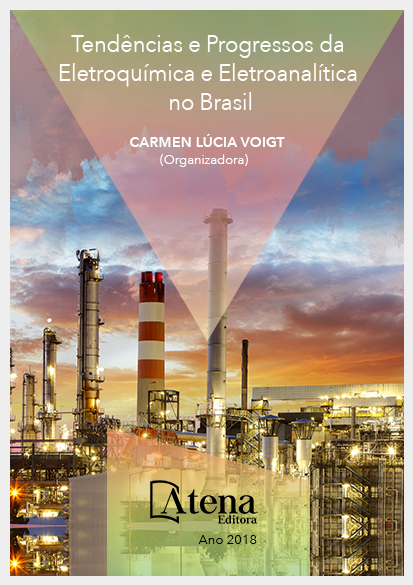
CARACTERIZAÇÃO ELETROCATALÍTICA DO CuO/Cu NA REAÇÃO DE REDUÇÃO DE CO2 UTILIZANDO ELETRODO DE DISCO ROTATÓRIO
A reação eletroquímica de redução
de CO2 tem ganhado interesse devido à
possibilidade de reciclagem de CO2
em
combustíveis renováveis como CH4
, C2
H2
,
CH3
OH e C2
H4
, possibilitando uma grande
demanda de fontes alternativas de energia.
Diante disso, este trabalho tem como objetivo, o
estudo das propriedades catalíticas do CuO/Cu
para a reação de redução eletroquímica do CO2
,
analisando o comportamento da reação frente a
variações do eletrólito e da velocidade de rotação
do eletrodo de trabalho. O eletrocatalisador foi
preparado pelo método de sol gel e a composição
dos catalisadores foi analisada por difração de
raios X, e o estudo da atividade eletroquímica
do sistema foi feito imobilizando uma camada
ultrafina porosa contendo os catalisadores em
um eletrodo policristalino de disco rotatório,
cuja velocidade de rotação varia entre 360 a
3600 rpm. O comportamento eletroquímico do
catalisador imobilizado foi estudado utilizando
técnicas de voltametria cíclica e voltametria
de varredura linear. Os resultados mostraram
que o CuO/Cu desloca o potencial de inicio
da reação para valores mais positivos quando
comparados ao Cu metálico apresenta como
etapa determinante da reação a transferência
de elétrons sobre o eletrodo.
CARACTERIZAÇÃO ELETROCATALÍTICA DO CuO/Cu NA REAÇÃO DE REDUÇÃO DE CO2 UTILIZANDO ELETRODO DE DISCO ROTATÓRIO
-
DOI: ATENA
-
Palavras-chave: Redução eletroquímica, CO2 , óxido de cobre, eletrodo rotatório
-
Keywords: Electrochemical reduction, CO2, copper oxide, rotational electrode
-
Abstract:
The electrochemical CO2
reduction
reaction has gained interest due to the possibility
of CO2
recycling in renewable fuels such as CH4
,
C2
H2
, CH3
OH and C2
H4
, making possible a great
demand of alternative sources of energy. The
objective of this work is to study the catalytic
properties of CuO/Cu for the electrochemical
CO2
reduction reaction analyzing the behavior
of the reaction against electrolyte variations
and rotation speed of the working electrode.
The electrocatalyst was prepared by the sol gel
method and the composition of the catalysts
was analyzed by X-ray diffraction, and the
study of the electrochemical activity of the system was made by immobilizing a porous ultrafine layer containing the catalysts in a
polycrystalline rotating disk electrode whose velocity rotation ranges from 360 to 3600
rpm. The electrochemical behavior of the immobilized catalyst was studied using cyclic
voltammetry and linear scanning voltammetry techniques. The results show that CuO/
Cu shifts the initial reaction potential to more positive values when compared to Cu
metal, as the reaction determinant of the transfer of electrons on the electrode
-
Número de páginas: 15
- kenia da silva freitas


